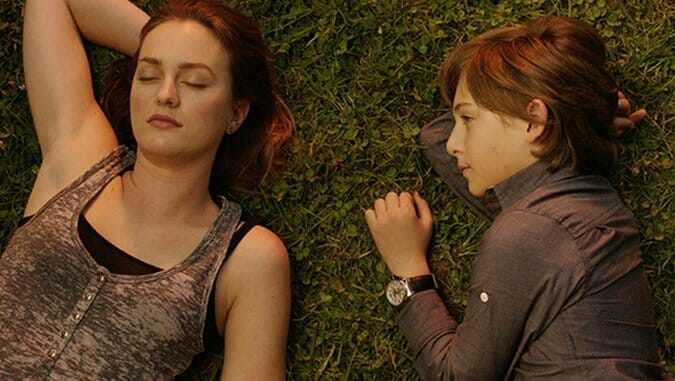
Frank Whaley—yup, that Frank Whaley, the guy who got blasted up in Pulp Fiction and played Robby Krieger in Oliver Stone’s trippy spin on the life of Jim Morrison in The Doors—has more recently taken up residence behind the camera. His latest directorial endeavor, Like Sunday, Like Rain, is a quirky little melo-ditty that’s oddly apt and indicative of the indie predilections Whaley has shown before, on either side of the lens.
The story, also written by Whaley, centers on a pressed 20-something struggling musician named Eleanor (Leighton Meester, best known from Gossip Girl, but who also recently released a full-length pop album) who threshes about Manhattan without much forward momentum. Her boyfriend, a philandering, wannabe rock star (played by mall-punk bro Billie Joe Armstrong) burdens Eleanor with unending late nights and no shows, and when she finally gets up enough muster to kick him out (tossing his guitar out the window for punctuation), he pops by the café where she’s meagerly employed and instigates her firing.
Across town, and on the other side of the economic universe, musical prodigy Reggie (Julian Shatkin), a precocious 12 year-old whose family has unlimited funds and a penthouse-styled pad with its own swimming pool, occupies the malaise of lonely luxury by playing the cello, composing music (the film’s title is one of his creations and a hauntingly beautiful one at that) and reading—all of which distresses his lockjaw’d and massage-needy mother (Debra Messing) to the point that she mandates a companion/nanny, which of course is where Eleanor, needing a roof and some dinero, winds up.
Shot with stark rich opulence by Jimi Jones, Like Sunday, Like Rain offers plenty of nuance beyond the rich introvert binding with his “hot nanny.” Eleanor, from working class roots upstate, has an ailing father in the hospital and deep dysfunctional dissent with the other members of her kin. There’s also her quest to be more than an answer to a help wanted ad, and that guy from Green Day keeps showing up. Can Billie Joe act? Awkward would be the most polite way to put it, but the film doesn’t ask too much of him, plus the character is right off the tattooed, self-absorbed hack stock pile. Reggie, and more so his mom, too lack depth of character, though the film does sentimentally sell Reggie’s predicament by the end. The added touch of sass and can-do (the kid pays off the hired help to look the other way when he doesn’t want to go to school or camp) both endears (he never condescends and is humane) and repels (he doesn’t think much of the arrogance inherent in buying people off).
Themes of alcoholism and troubled upbringings regardless of fiscal resources, coupled with the piquant gastronomical pursuits and the ongoing contemplation of art and its relevance, go far to strengthen the effort. Whaley’s best asset, however, is Meester, and much is asked of her. There’s an obvious image Whaley has in his mind for the complete character of Eleanor, but he’s given his actress too many dots to connect—or more than is advisable. No matter though, because Meester, with her natural, easy fit into the role, proves game and goes after those gaps with an indelible marker. It all doesn’t quite add up and fly, but in its recurrence the bittersweet melody of the title (composed by British musician Ed Harcourt) fills in the emotional voids where the script and the players fall out of rhythm.
Director: Frank Whaley
Writer: Frank Whaley
Starring: Leighton Meester, Debra Messing, Billie Joe Armstrong, Julian Shatkin
Release Date: Oct. 6, 2014
Tom Meek is a writer living in Cambridge, MA. His reviews, essays, short stories and articles have appeared in The Boston Phoenix, The Rumpus, Thieves Jargon, Charleston City Paper and SLAB literary journal. Tom is also a member of the Boston Society of Film Critics and rides his bike everywhere. You can follow him on Twitter.